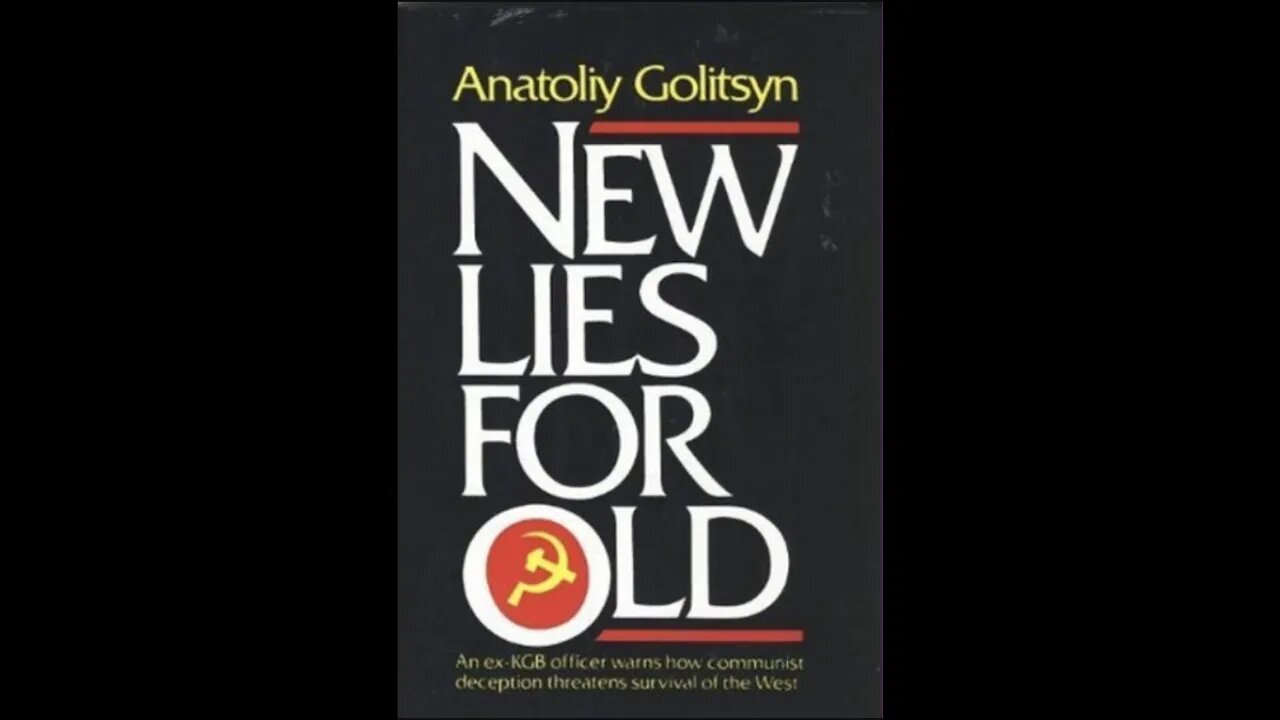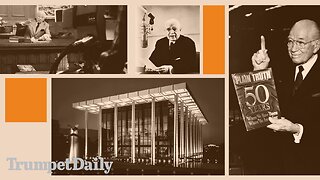Premium Only Content

Anatoliy Golitsyn – New Lies for Old – 18 – The Alleged Recurrence of Power Struggles
Chapter 18: The Sixth Disinformation Operation: The Alleged Recurrence of Power Struggles in the Soviet, Chinese, and Other Parties
http://www.doomedsoldiers.com/pdfs/new_lies_for_old_golitsyn.pdf
196 — Succession in the Soviet Leadership: New Stabilizing Factors
200— Khrushchev's "Removal" an Agreed Transfer of the Leadership
to Brezhnev
206 — Objectives of Disinformation on Power Struggles
Support:
paypal.me/mario1337
BTC: 35iDtUzZq33CoJhmK38TdV9Xunvs7TKmzX
ETH: 0xf396A0e10911b4BC975CfE80117412D484B24d1e
Notes
1. In the author's opinion, Robert Conquest and Myron Rush both misinterpreted the change of leadership from Khrushchev to Brezhnev in their books, respectively, Russia after Khrushchev (New York. Frederick A. Praeger, 1965) and Political Succession in the USSR (New York Research Institute on Communist Affairs, Columbia University Press, 1965).
2. See Lenin's letter of 1923, published in Kommunist, no. 9 (1956), pp. 11-17: "Comrade Stalin, having become General Secretary, has concentrated enormous power in his hands and I am not at all certain that he is capable of always utilising this power with sufficient caution."
3. Rush's analysis of the succession problems after Lenin's and Stalin's deaths, given in Political Succession in the USSR, is in general accurate. See pp. 39-43: "Lenin's effort to influence the succession with respect to personalities, policy, and organization met complete defeat. His advice, offered after serious deliberation and with due gravity, was disregarded even while he lived by men who professed to serve him.
4. See his concluding remarks to the Twenty-second CPSU Congress {CSP, vol. 4, p. 200): "It is wrong, comrades, it is simply impossible to permit the inception and development of instances when the merited prestige of an individual may assume forms in which he fancies that everything is permissible to him and that he no longer has need of the collective. In such a case this individual may stop listening to the voices of other comrades who have been advanced to leadership, just as he was, and
may begin suppressing them. Our great teacher V. I. Lenin resolutely fought against this, and the Party paid too dear a price for not heeding his wise counsel in good time. So let us be worthy disciples of Lenin in this important matter."
5. Ibid.: "But each leader must also understand the other side of the matter— never to plume himself on his position, to remember that in holding this or that post he is merely fulfilling the will of the Party and the will of the people, who may have invested the greatest power in him but never lose control over him. The leader who forgets this pays heavily for his mistake. I would add that he will pay while he is alive, or even after his death the people will not forgive him, as has happened with the condemnation of the cult of Stalin. A person who forgets that he is obliged to fulfill the will of the Party and of the people cannot, properly speaking, be called a true
leader; there must be no such 'leaders' either in the Party or in the state apparatus."
6. Ibid., p. 198: "In the conditions of the cult of the individual, the Party was
deprived of normal life. People who usurp power cease being accountable to the Party, they escape from under its control. Herein is the greatest danger of the cult of the individual. The situation in the Party must always be such that every leader is accountable to the Party and its agencies, and the Party can replace any leader when it considers this necessary."
7. Ibid., p. 200: "I would like to say a few words about the following question. In many speeches at the Congress, and not infrequently in our press as well, when mention is made of the activity of our party's Central Committee, a certain special emphasis is placed on me personally and my role in carrying out major Party and Government measures is underlined. I understand the kind feelings guiding these comrades. Allow me however to emphasise emphatically that everything that is said about me should be said about the Central Committee of our Leninist Party, and about
the Presidium of the Central Committee.
8. Ibid., pp. 199-200: "The 22nd Congress is confirming this beneficial course. The Party Programme and Statutes and the resolutions of the congress set forth new guarantees against relapses into the cult of the individual. The role of the Party as the great inspiring and organising force in the building of communism is rising higher still."
9. Stenographic records of the Twenty-second Congress (Moscow, 1962), vol. 3, pp. 356-60.
10. The information about the relationship of these leaders to Khrushchev
was obtained from KGB officials in the Ukraine and Moscow (Kolesnikov and Kochurov) and was partially confirmed in Zhukov's attack on Khrushchev at the meeting of the Politburo in the fall of 1957.
#intelligence #perestroika #kgb
-
 56:07
56:07
Eugen Richter Audiobooks
1 year agoMutiny in Russia, War in Ukraine: A Panel Discussion • Jeff Nyquist, Trevor Loudon, Clare Lopez
447 -
 13:24
13:24
EvenOut
11 hours ago $0.82 earnedMATRIX AGENTS TAKE OVER REALITY!
4.3K1 -
 11:27
11:27
Reforge Gaming
12 hours agoThe GTA 6 Problem
17.1K2 -
 1:24:23
1:24:23
Kyle Rittenhouse Presents: Tactically Inappropriate
11 hours ago $0.95 earnedThe Lawman
8.32K1 -
 10:36
10:36
Clownfish TV
10 hours agoMSNBC and Rachel Maddow NEED Trump to Stay in Business...
18.3K3 -
 4:10
4:10
PerpetualHealthCo
18 hours agoFDA Bans Red Dye No.3
4.13K1 -
 59:57
59:57
Trumpet Daily
20 hours ago $3.73 earnedRemembering Herbert W. Armstrong - Trumpet Daily | Jan. 16, 2025
6.91K12 -
 26:07
26:07
The Lou Holtz Show
14 hours agoThe Lou Holtz Show S 2 Ep 1 | Tony Rice on Championship Leadership and Notre Dame Legacy #podcast
14.3K -
 53:37
53:37
Weberz Way
14 hours agoGOODBYE JOE, TRUMPS CABINET, LA FIRES, & KEEP TIKTOK
8.48K -
 3:07:17
3:07:17
Alex Zedra
10 hours agoLIVE! New Game | Exorcism!??
36K4